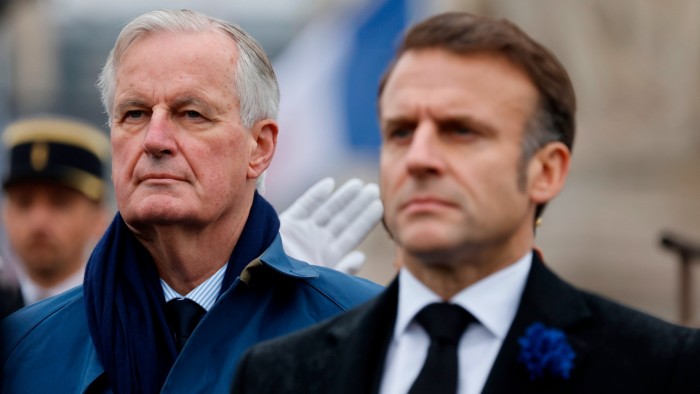Unlock the Editor’s Digest for free
Roula Khalaf, Editor of the FT, selects her favourite stories in this weekly newsletter.
French Prime Minister Michel Barnier has resigned after his government was ousted by MPs in a vote of no confidence.
The Élysée said on Thursday that Barnier had handed in his resignation but that President Emmanuel Macron had asked him to stay in the role until a successor had been appointed.
Barnier’s resignation comes during a dramatic week in which his three-month-old minority administration was toppled by lawmakers from the far-right Rassemblement National (RN) and leftist Nouveau Front Populaire (NFP) bloc over a deficit-reducing budget.
Macron, who will address the nation on Thursday evening, must now navigate the difficult task of selecting a new prime minister who will face the same difficult equation in a fractured, hung parliament.
Under France’s constitution, the president cannot call new legislative elections until July, a year after the last vote.
The resignation confirms Barnier as the shortest-serving prime minister in France’s Fifth Republic, and only the second to be voted down by a no-confidence motion.
Macron chose the veteran rightwing politician for the role after his hand was significantly weakened when he called and lost snap legislative elections this summer, resulting in a hung parliament.
Barnier’s government fell largely because of RN leader Marine Le Pen’s decision to withdraw her tacit support for his administration over the budget, despite the prime minister offering last-minute concessions.
“I do not consider this to be a victory. I consider that we had a choice to make and the choice we made was to protect the French people,” Le Pen said shortly after the vote on Wednesday, adding that once a new prime minister was named the RN would work with all parties “to co-create a budget that is acceptable for all”.
Le Pen said she was confident a budget would be passed. “Our institutions are made of granite,” she said.
Macron must now decide whether to rebuild a similar alliance with Barnier’s party, Les Républicains, or attempt to forge a new configuration, perhaps this time with more moderate MPs from the left.
Former prime minister Gabriel Attal has called for a loose alliance that would add Socialist MPs to those from his Renaissance party, their centrist allies and the LR, to reduce the RN’s ability to overturn the next government.
But overtures from the centrists to the centre left have not so far persuaded them to break away from the NFP alliance, which includes the far left.
Macron is facing growing pressure — notably from the far left and the far right — to resign before the end of his term in 2027 to break the deadlock, an option that he criticised this week as “political fiction”.
“Those who want the head of state to depart are making themselves accomplices in a creeping coup d’état,” François Bayrou, a centrist Macron ally, said on BFMTV on Thursday. “The head of state is a symbol of the stability we need given the crisis we are going through.”
Barnier’s administration collapsed without adopting the contentious 2025 budget, which included a €60bn package of tax rises and spending cuts aimed at reducing the deficit from more than 6 per cent this year to about 5 per cent next year.
His successor will have to craft a new budget ahead of an end-of-year deadline or adopt stop-gap measures to keep the state functioning.
Yaël Braun-Pivet, president of the National Assembly, on Thursday called for a government to be formed “rapidly” so budget discussions could be resumed.
“There is still time to provide France with a budget before the end of the year. Time is extremely tight, but it is legally and politically possible if everyone sits around the table again,” she said on France Inter radio.
The parliamentary gridlock will continue to make budget talks difficult.
The far-left La France Insoumise party has said it will “automatically censure” any prime minister who is not drawn from the leftist NFP, made up of four parties.
French 10-year bond yields were little changed on Thursday, at 2.89 per cent. Its spread with benchmark German debt, a key measure of investor anxiety, fell to 0.78 percentage points, its lowest since late November. Paris’s Cac 40 stock index was 0.3 per cent higher in late afternoon trade.
“The fall of the government leaves France without a clear path towards reducing its budgetary deficit,” rating agency S&P wrote on Thursday.
It added that it now expected “considerably less budgetary consolidation” than under the measures proposed by Barnier. It maintained France’s credit rating last week despite the country’s political upheaval.
Additional reporting by Mari Novak and Ian Smith
Read the full article here




